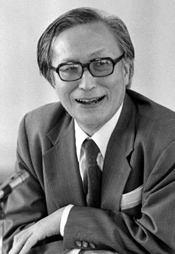 ‘I’d rather believe in the falsity of post-war democracy than the actuality of the Empire of Japan’
‘I’d rather believe in the falsity of post-war democracy than the actuality of the Empire of Japan’
Maruyama Masao (1914-1996) was a Japanese intellectual historian, perhaps best known for the quote mentioned above. It is from the afterword of the revised edition of his seminal Thought and Behaviour in Modern Japanese Politics from 1964 (the English edition was published in 1969). Within its opening essay, first published in 1946, he unearthed the psychological sanctions in modern Japan’s ultra-nationalism, which led the country to the devastating Pacific War. With this essay, Maruyama became an icon of 20th century Japanese political thought. The aforementioned quote indicates that within two decades after the end of the war, the new democracy brought by Americans had already turned out to be something plastic for him, whilst the nightmare of the Japanese empire still remained. To date, he has been the most praised and the most criticized scholar both from the political right and left in Japan. This was not because his discourse was equivocal, but because Maruyama consistently tackled the same essential question of humanity in the rapidly changing intellectual landscape in Japan: that is, the question of subjectivity in the context of global knowledge (re)production and dissemination. Here, his puzzle can be paraphrased as follows: Is the democracy the Japanese imported really the same democracy as that in the West?
It is hardly unusual in the political world that a dubious statement by a politician is supported by the majority. This is the enigma of ideology that many thinkers, including Maruyama, have tackled in the era of democracy. For him, however, the choice was seemingly not ‘between a “fictitious” environment and a “real’ one, but that which sounds better for a specific group of people’. This complexity is hard to capture because ‘we never went any further than to see it as a combination of power and ideology. We have not investigated the problem deeply from the standpoint of the daily feelings of the people who lived in that world’ (Maruyama, 1969: 343-344). Ideology is inextricably linked to our everyday realm, and therefore its power is essentially site-specific. The mechanism in which it works can be meticulously observed only by experiencing the particular space itself. For this reason, it is often difficult for outsiders to comprehend why a particular people seem to be caught in an ideological trap, as is still seen across the contemporary world. For Maruyama, in addition, as evidenced in the post-war Japanese experience of democratisation, this apparent ‘falsity’ is hardly noticed even by the people themselves. Put bluntly, democracy in Japan was not the democracy Maruyama learned from Western texts; it was evidently a Japanised one. The paradox here was that it was because of, not despite of, the distortion, that the country was successfully democratised.
Indeed, this was a vexed question for Maruyama: How could the crucial ‘mistake’ be adjusted, if it was the exact deviancy from the Western standard of democracy that made democratization possible in Japan? In other words, it is this misunderstanding that provided the Japanese people with the subjectivity of knowledge. He tackled this issue by taking a twofold approach. Whilst he as a scholar analyzed the system of subtle mutation, he tried to educate people to know themselves better so as not to be distorted by the falsities they are exposed to through public commentaries and small talk sessions with ordinary people. What is notable is that apparently, he did not try to find a ‘we’, or in today’s term, true Japanese identity, by adjusting the misunderstanding. Rather, by acknowledging the enigmatic role of falsity in popular (un)consciousness, he tried to educate the people to become each an independent ‘I’ by knowing themselves, in a similar manner to a few notable Western thinkers like Hannah Arendt, who coped with totalitarianism. For him, following the Japanese enlightenment thinker Fukuzawa Yukichi, the state as a political community had to be formed through the establishment of each individual self and never through the unification of people. This is because, for Maruyama, ‘the function of intelligence consists in any age in understanding others…as others’ (Maruyama, 1969: 348).
Essential Reading
Karube, T. (2008) Maruyama Masao and the Fate of Liberalism in Twentieth-Century Japan. D. Noble trans. International House of Japan.
Haag, A. (2011) Maruyama Masao and Katō Shūichi on translation and Japanese modernity. In: Levy, I. ed. Translation in Modern Japan. Routledge. pp. 15-43.
Maruyama, M. (1969) Thought and Behaviour in Modern Japanese Politics. Oxford University Press.
Further Reading
Barshay, A. (2004) The Social Sciences in Modern Japan: The Marxian and Modernist Traditions. University of California Press.
Maruyama, M. (1974) Studies in the Intellectual History of Tokugawa Japan. Translated from the Japanese to English by M. Hane. University of Tokyo Press.
Kersten, R. (1996) Democracy in Postwar Japan: Maruyama Masao and the Search for Autonomy. Routledge.
Rösch, F. (2017) Unlearning Modernity: A realist Method for Critical International Relations? Journal of International Political Theory, 13(1), pp.81-99.
Rösch, F. and A. Watanabe. (2016) Approaching the Unsynthesizable in International Politics: Giving Substance to Security Discourses through Basso Ostinato? European Journal of International Relations. doi: 10.1177/1354066116656764.
Sasaki, F. (2015) Nationalism, Political Realism and Democracy in Japan. The Thought of Masao Maruyama. Routledge.
Questions
Can the meaning of a concept, such as democracy or modernity, be universally applicable?
How can we define ‘democracy’, for example?
Who is the ‘authority’ of the definition?
How do we judge the political right and left? What is the criteria?
What is the role of ‘people’s daily feelings’ in identity politics? What is the implication for contemporary examples like ‘Brexit’ or ‘President Trump’?
Submitted by Atsuko Watanabe